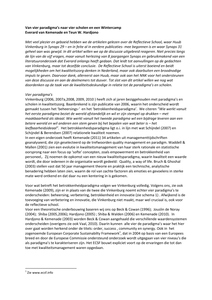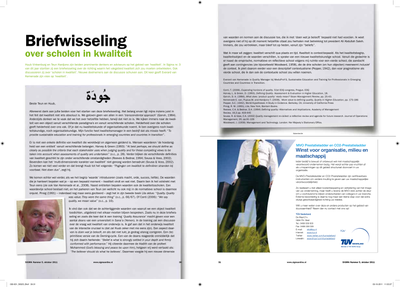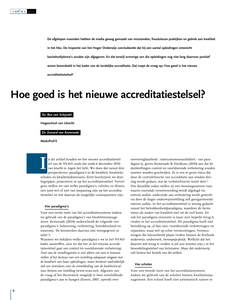De PDCA- of Demingcyclus is het hart van de kwaliteitskunde en heeft haar nut bewezen. Het is echter geen panacee, datin alle culturen en op alle tijden even bruikbaar is. Met nanme in andere dan westerse culturen in tijden van snelle veranderingen voldoet Plan-Do-Check-Act niet.
DOCUMENT

Al enige tijd woedt in kwaliteitsland de discussie over de kwaliteitsscholen, geinitieerd door Huub Vinkenburg. Een van de vragen daarbij is: wat opnderscheidt de kwalietitskunde van andere kundes zoals organisatiekunde? In deze bijdrage aan de discussie wil ik een lans breken voor een element dat tot dusver te weinig aandacht heeft gekregen: de strategische context van de organisatie/
DOCUMENT
Theorieën die betrekking hebben op de kwaliteit van producten, processen, systemen en organisaties (systeemtechnische aspecten) geven geen of onvoldoende antwoord op vragen en problemen die betrekking hebben op de rol van de ‘factor mens’ in kwaliteitsmanagement. Omdat daar wel behoefte aan is, zijn de afgelopen jaren nieuwe theorieën ontwikkeld die wel oplossingsstrategieën bieden. Dit zijn kwaliteitsparadigma’s (beheersing en betrokkenheid), kwaliteitsscholen (empirische, normatieve en reflectieve school) en de drie kwaliteitsdimensies (professionele, organisatorische en relationele kwaliteit). In alle drie concepten zijn systeemtechnische (object/proces/norm) en sociaaldynamische (mens) aspecten gecombineerd. Betrokkenheid, reflectieve school en relationele kwaliteit zullen bepalend zijn voor het toekomstige kwaliteitsmanagement waarin de human factor een steeds belangrijker plaats gaat innemen.
DOCUMENT

Er zit een gat tussen de theorie van het vakgebied economie en het praktijkgedrag van mensen. In de kwaliteitskunde lijkt het niet anders te zijn. De klassieke kwaliteitssystemen AQAP, ISO, INK/EFQM zijn in principe opgezet om tot verbetering van halffabricaten en eindproducten te komen.
DOCUMENT

Recentelijk is een discussie ontstaan over scholen in kwaliteitsmanagement, met nadruk op het verschijnsel van de reflectieve school. Van Kemenade en Hardjono pleiten voor vier scholen en van alle vier zou de kwaliteitsmanager de bijbehrende competenties oeten bezitten.
DOCUMENT

Kwaliteitsmanagement is lange tijd gekenmerkt geweest door wat je het empirisch paradigma (Van Kemenade & Hardjono, 2018) zou kunnen noemen. Binnen die manier van denken is kwaliteitskunde meten en gaat het onder andere om prestatie-indicatoren. Kwaliteit is voldoen aan de vereisten. Verbetering en verandering is te plannen. Statistiek is zijn belangrijkste wetenschap. De manager controleert. Een risico echter van dit kwaliteitsparadigma is, dat er een enorme bureaucratie ontstaat. Erger nog: ze houdt onvoldoende rekening met de complexiteit van het huidige tijdsgewricht.
DOCUMENT

Bijdrage aan briefwisseling over scholen in de kwlaiteitskunde, pleitend voor de contextuele school.
DOCUMENT

In het recent verschenen boek ‘Kwaliteitsmanagement in de praktijk’ verbinden de auteurs de systeem-technische met de sociaal-dynamische aspecten van kwaliteitsmanagement. Hiermee laten zij een holistische aanpak van het vakgebied zien. In dit artikel belichten zij drie thema´s die de benadering in het boek illustreren: kwaliteitsdimensies, procesregie en verbeteren
DOCUMENT

Het nieuwe accreditatiestelsel doorgelicht m.b.v. scholen in kwaliteitsmanagement, paradigma's en kwaliteitsmethode K2F.
DOCUMENT

In het domein „verrichten‟ zijn professionele effectiviteit en professionele kwaliteit belangrijke handelingswaarden. Bij effectiviteit gaat het om de vraag of de professional daadwerkelijk de professionele doelen (of humanitaire waarden) realiseert. En bij professionele kwaliteit gaat het om de vraag hoe goed hij of zij dat doet. Voldoet het werk aan de professionele standaarden? Aan professionele kwaliteit dragen veel factoren bij, die niet alleen met de individuele reclasseringswerker te maken hebben maar ook met de context van de organisatie. Denk aan opleidingen, trainingen, beleid en kwaliteitssystemen, HRM beleid, arbeidsklimaat. Professionele kwaliteit van reclasseringswerkers zelf heeft te maken professionele expertise, die tot stand komt in een voortdurende interactie tussen expliciete algemene – en methodische kennis en systematische reflectie op impliciete ervaringskennis. Omdat het congres in het teken stond van het expliciteren en vergroten van deze ervaringskennis (practice based evidence) is in de workshop over professionele kwaliteit alleen bij de tweede vorm stilgestaan.
DOCUMENT
